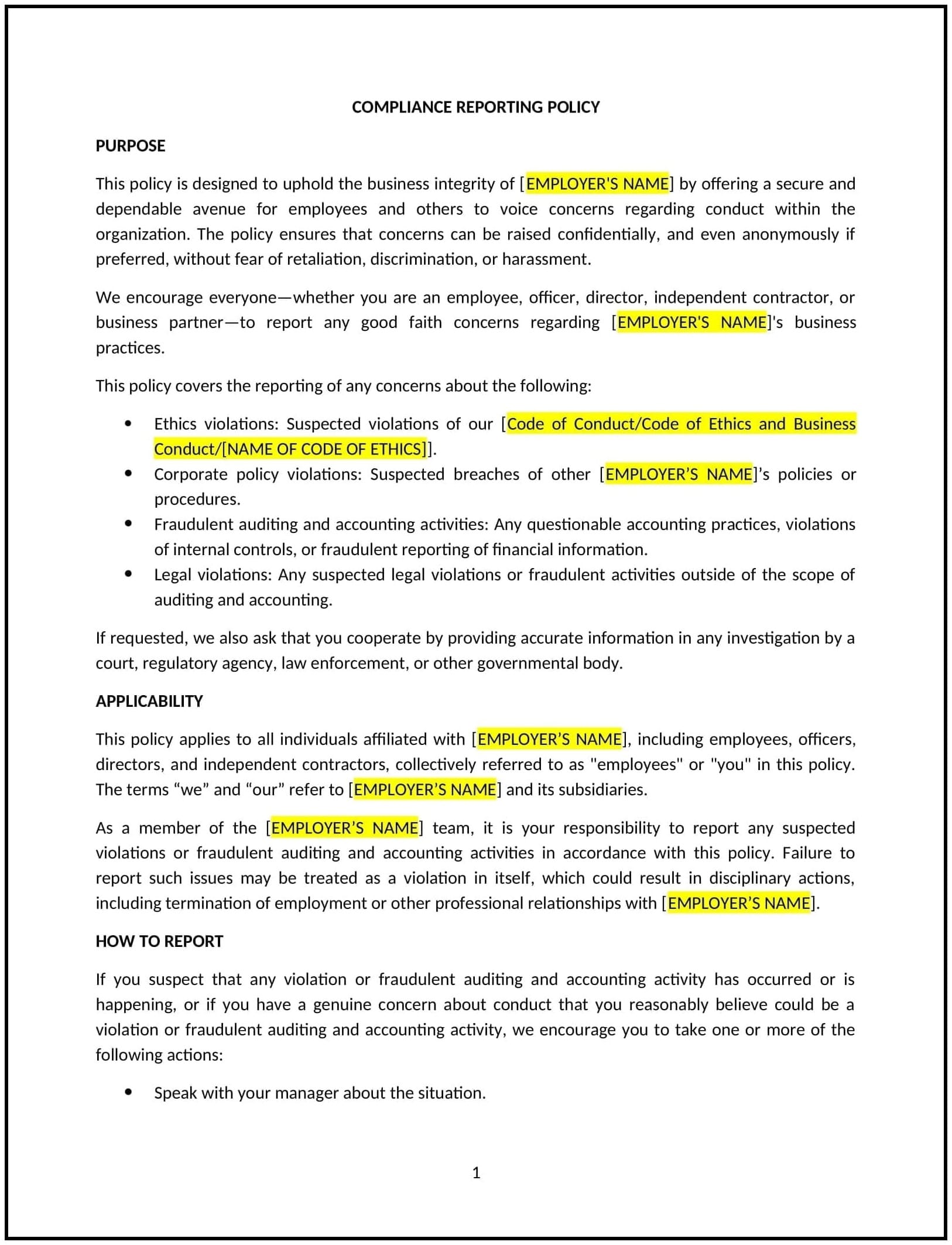Compliance reporting policy (Montana): Free template
Got contracts to review? While you're here for policies, let Cobrief make contract review effortless—start your free review now.

Customize this template for free
Compliance reporting policy (Montana)
A compliance reporting policy helps Montana businesses establish clear guidelines for identifying, reporting, and addressing non-compliance with laws, regulations, and internal policies. This policy outlines the process for reporting suspected violations, protecting whistleblowers, and ensuring accountability.
By implementing this policy, businesses can foster a culture of transparency, reduce the risk of legal issues, and ensure that compliance is maintained across all operations.
How to use this compliance reporting policy (Montana)
- Define what constitutes non-compliance: Businesses should specify the types of violations that should be reported, including breaches of laws, regulations, company policies, ethical standards, or environmental guidelines.
- Establish reporting channels: Businesses should provide clear, accessible channels for reporting non-compliance, such as designated compliance officers, an anonymous reporting hotline, or a secure online platform.
- Ensure confidentiality and protection for whistleblowers: The policy should include measures to protect employees who report non-compliance from retaliation, including confidentiality of the reporting process.
- Set investigation and resolution procedures: Businesses should outline how reports will be handled, including who will investigate the issue, the timeline for resolution, and how outcomes will be communicated to the reporter.
- Define disciplinary actions for violations: Businesses should clarify the consequences of non-compliance, which may include warnings, suspension, termination, or legal action depending on the severity of the violation.
- Include training and awareness programs: Businesses should provide regular training on the importance of compliance reporting and how to report violations effectively.
- Review and update regularly: Businesses should periodically assess and update the policy to ensure it remains aligned with legal requirements and industry best practices.
Benefits of using this compliance reporting policy (Montana)
This policy provides several key benefits for Montana businesses:
- Promotes a culture of integrity: Clear guidelines encourage employees to act ethically and report issues without fear of retaliation.
- Reduces legal risks: A structured compliance reporting system helps businesses identify and address violations early, minimizing the risk of legal action.
- Increases accountability: Businesses can hold employees and management accountable for upholding legal and ethical standards.
- Improves transparency: Reporting mechanisms provide a transparent process for addressing non-compliance issues, increasing trust within the organization.
- Encourages proactive issue resolution: Employees feel empowered to report concerns, helping businesses address potential problems before they escalate.
- Enhances regulatory relationships: Businesses that adhere to compliance reporting standards are viewed as trustworthy and responsible by regulators and customers.
Tips for using this compliance reporting policy (Montana)
- Communicate the policy effectively: Businesses should ensure that all employees are aware of the compliance reporting policy, how to use reporting channels, and the protections in place for whistleblowers.
- Ensure accessibility: Reporting channels should be easy to access, confidential, and available to all employees, contractors, and other stakeholders.
- Offer multiple reporting options: Businesses should provide various methods for employees to report concerns, such as direct contact with compliance officers, anonymous hotlines, or online platforms.
- Take prompt action on reports: Businesses should investigate reported violations promptly and ensure that corrective actions are taken in a timely manner.
- Protect whistleblowers: Businesses should make it clear that employees who report violations will not face retaliation, and offer protection from negative consequences.
- Regularly review and update the policy: Businesses should review the policy annually or when new legal or regulatory changes require updates to ensure it remains relevant and effective.